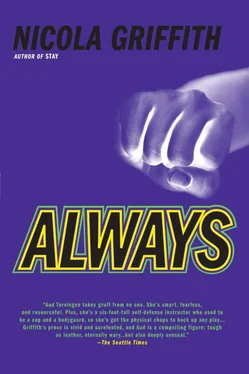I popped loose a button taking off the skirt. She’d married a man who liked fast cars and Gilbert and Sullivan; the suede trousers would be more suitable.
On the way out, I put the lily-laden wastebasket in the corridor to be emptied. The smell made me want to retch. I put the Loetz vase on the backseat of the car where I would see it tomorrow and remember to return it. I opened all four windows.
Halfway down Second Avenue, I changed my mind, and instead of continuing to University Street, turned right on Stewart and drove to Pike Place. The market was closing and stank of fish-slimed tile and discarded ice. All the flower stalls but one were shut tight, and that was in the process of closing.
“Wait,” I said, “I need some flowers.”
“Not much left, but take pick,” the tiny Korean woman said.
There were no roses or orchids, no lilies or carnations, nothing left but the kind of raggedy garden flowers that were one step up from weeds: snapdragons and gerbera daisies and freesias. They smelled light and lovely, and their colors were bright and cheerful. The exact opposite of elegance. I bought a handful of each, and gave her an extra twenty dollars for the plastic bucket of water to stand them in until I got to the hotel.
BETWEEN THEvalet parking station and the reception desk in the lobby of the Fairmont, two bellboys offered to carry my sloshing bucket and little vase. When I gave my name at the desk, the receptionist summoned the special elevator, then asked if I’d need any help getting to the Presidential Suite. If she had said, Ma’am, that bucket is ugly, please let one of the staff take it up via the service elevator so our guests won’t have to see it, I might have accepted. Instead I took a perverse delight in pretending to misunderstand. “Oh, it’s not heavy, but thank you.” She nodded in that You are of course crazy, but you’re the customer and, hey, it takes all kinds Seattle way, and appeared unperturbed when I changed my mind and told her I’d take the flowers and leave the bucket with her, and did she have any spare tissue paper to wrap the vase?
THE PRESIDENTIAL SUITEhad double doors and a bell push. My first surprise was that my mother answered the door herself. The second was that her hair was almost wholly grey. I was still staring at it when she plucked the vase and flowers from me, put them on a table, and took both my hands in hers. They felt smaller than they should have, and very cool.
“Aud,” she said, and we stood there without speaking, and then she ran her thumbs over the backs of my knuckles. It had been twenty-five years since she’d done that, but my body remembered, and it was telling me I should be half my mother’s height, while my eyes told me I was, in fact, an inch taller. She smiled, squeezed, and let go. My hands sank to my sides, though in some alternate reality they reached out. “Aud, I would like you to meet my husband, Eric Loedessoel. Eric, this is my daughter, Aud.”
A man stepped forward from nowhere, and the world snapped back to its proper dimensions. I held out my hand, he grasped it in his, and shook vigorously.
“Aud, I am so very, very pleased to meet you.” A mid-Atlantic accent. We were speaking English, then. I looked at his hand, and he let go. He smiled. The dental work was not visible. “My apologies,” he said. “It’s just that I’ve wanted to meet you for so long.”
“The flowers,” I said. “They need to be in water.” I looked around for the usual efficient assistant.
“Come and sit,” my mother said, and picked up the vase and flowers and moved through the double doors to the sitting room. She even moved differently, as though she had been unbound in some way. Eric and I followed.
There were flowers everywhere, huge formal arrangements in stately vases. A purple petal fell off one of the snapdragons and settled forlornly on the red carpet. She pointed to a sofa upholstered in cream-striped beige silk.
“I won’t be a moment.” She stepped into the guest bathroom and ran water. Now that I couldn’t see her I realized I had no idea what she was wearing. Something green?
“Aud?” I looked up. Eric gestured at a wet bar, and a row of bottles and glasses. “Something to drink?”
“A kamikaze,” I said, just to see how he’d handle it.
“Ah. Well, a kamikaze just happens to be one of the hundreds of cocktails I have no idea how to make.” His shoulders were loose and relaxed. “If you have your heart set on one, we could figure it out between us. Failing that, we can get the bar to send one up, or I could promise you I’ll learn how to make it for next time, and meanwhile make you something I’m more familiar with.”
I said nothing.
His pause was very brief. “I understand gin and French pretty well, but admittedly only straight up and on the dry side. I understand a good malt whiskey and fine bourbon. Your mother made sure we have akevit— though I tell you frankly I don’t know good from bad—and of course we have a variety of beer. Or we could simply try the wine the hotel sommelier recommended to match the food.”
On the table, not at all hidden by the flowers, were three beading bottles of white wine, two decanters of red, and an ice bucket with champagne. In the center was an artful arrangement of silver salvers: seafood, antipasti, salad, and glistening caviar with the old-fashioned accompaniments of toast points and minced onion and chopped egg.
“I know,” he said, nodding. “I’d hoped for turkey on rye or tuna salad, but the chef’s pride seems to have been at stake.”
I’d forgotten he’d spent a lot of time in Washington, D.C. He was wearing a white turtleneck in knitted silk and casual trousers in grey. His shoes and belt were thick and polished. His hair was also thick, with a natural-looking wave. He looked like a cross between a gay soap opera star and a member of the Senate.
“There,” said my mother, and put the Loetz vase and flowers on a side table. “Lovely. The perfect antidote.” She waved at the heavy vases, the stiff drapes, the gleaming silver, and glistening fish eggs, and her whole body swayed, like that of younger woman. Though her waistband was a little larger than it had been. “You always did have a good eye.”
Waistband. Jeans. She was wearing jeans.
“Aud?” I dragged my gaze away from the little rivets on her hip pocket. Both of them were looking at me. “A glass of wine?”
“Good,” I said. “Yes. Please.”
My mother in jeans, married to a man wearing Polo. The glass in my hand was reassuringly cold. I kept sipping until it was empty.
“An Oregon pinot gris,” Eric said as he refilled it. “I’m glad you like it.”
“Yes,” I said, and they talked some more, some polite chitchat about Vancouver and flights and food while I gathered my wits.
After a while my mother noticed I was beginning to understand what they were saying. She put her wineglass down. “How are you, Aud?”
“I’m… well.”
“When did you arrive in Seattle?”
“We’ve been here since Wednesday.”
“We?”
“Dornan. He’s…” He drinks coffee. I kill the people who mess with his girlfriends. “He’s a friend.”
Like Eric’s, my mother’s pause was barely noticeable. “I’m so sorry not to have invited him. We must meet tomorrow. For dinner, perhaps. Yes. Dinner. Tomorrow.” It had been a while since I had seen my mother surprised enough to repeat herself.
“What do you think of the city?” Eric said.
“I like it. An interesting blend of American and Scandinavian. And you—how long will you be staying?”
“A week, perhaps ten days.”
“I hear you have family here.”
“I do, but due to an unfortunate accident of timing, they are halfway through a six-week visit to India.”
Читать дальше












